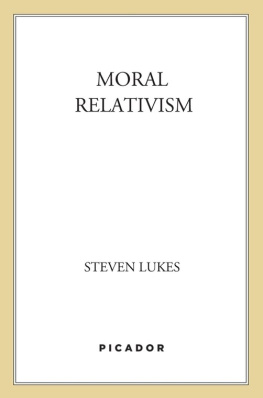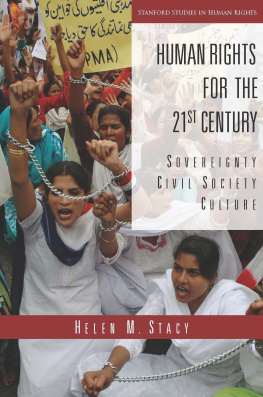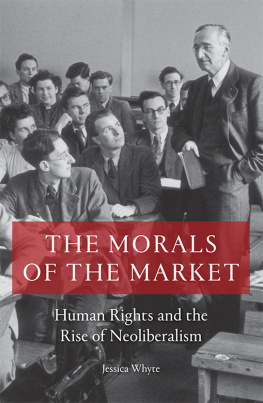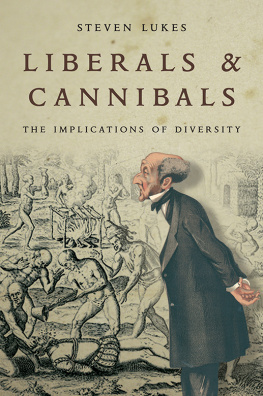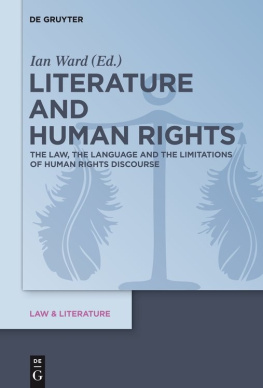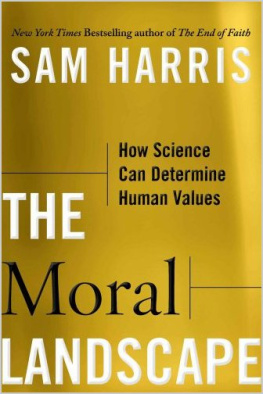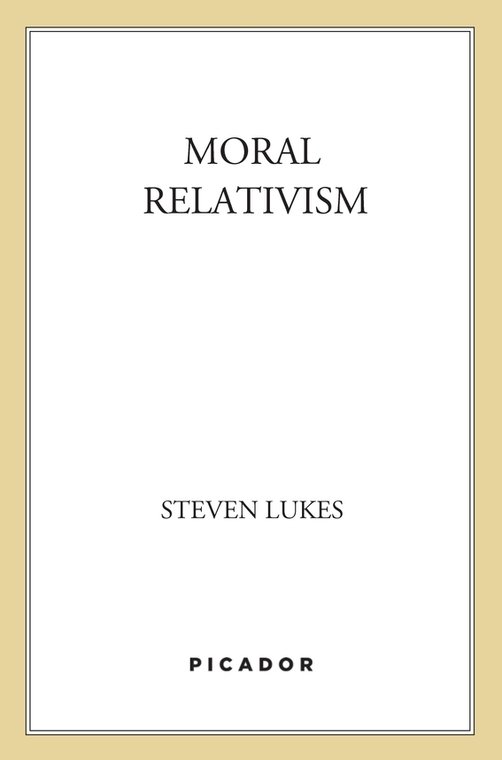1. Relativism: Cognitive and Moral
Friedrich Nietzsche, On the Genealogy of Morality , ed. Keith Ansell-Pierson, trans. Carol Diethe (Cambridge: Cambridge University Press, 1994), 92.
BBC News Magazine: 20 April 2005 ( http://news.bbc.co.uk/1/hi/magazine/4460673.stm ).
Allan Bloom, The Closing of the American Mind: How Higher Education Has Failed Democracy and Impoverished the Souls of Todays Students (New York: Simon and Schuster, 1987), 34.
Nietzche, Genealogy of Morality , 92.
Bernard Williams, The End of Explanation (a review of Thomas Nagels The Last Word), New York Review of Books 45, no. 18 (1998), 4041.
Marcy Darnovsky, Overhauling the Meaning Machine: An Interview with Dona Haraway, Socialist Review 21, no. 2 (1991), 66.
Both quotations come from Paul Boghossian, Fear of Knowledge: Against Relativism and Constructivism (Oxford: Clarendon Press, 2006), 2.
Renato Rosaldo, Culture and Truth: The Remaking of Social Analysis (Boston: Beacon Press, 1989), 21.
Paul Feyerabend, Against Method: Outline of an Anarchistic Theory of Knowledge (London: NLB, 1975), 295.
Thomas Kuhn, The Structure of Scientific Revolutions, 3rd ed. (Chicago: Chicago University Press, 1996). First published in 1962.
Bruno Latour, Science in Action: How to Follow Scientists and Engineers Through Society (Cambridge, MA: Harvard University Press, 1985), 258.
Paul Feyerabend, Atoms and Consciousness, Common Knowledge i, no. 1 (1992), 2832; Bruno Latour, Why Has Critique Run Out of Steam? From Matters of Fact to Matters of Concern, Critical Inquiry 30, no. 2 (2004), 22548.
Ian Hacking, The Social Construction of What? (Cambridge, MA: Harvard University Press, 1999).
Karl Mannheim, Ideology and Utopia: An Introduction to the Sociology of Knowledge (London: Routledge and Kegan Paul, 1936; paperback edition 1960), 237. Citation is to the latter edition.
Robert K. Merton, Social Theory and Social Structure, rev. ed. (Glencoe, IL: Free Press, 1957), 507.
Benjamin Lee Whorf, Language, Thought and Reality (Boston: MIT Press; New York: Wiley, 1954), 213.
Edward Sapir, The Status of Linguistics as a Science, Language 5, no. 4 (1929), 209.
Lucien Lvy-Bruhl, Les functions mentales dans les socits infrieures (Paris: Alcan, 1910), 30-31.
E. E. Evans-Pritchard, Witchcraft, Oracles and Magic among the Azande (Oxford: Clarendon Press, 1937).
Peter Winch, Understanding a Primitive Society, American Philosophical Quarterly 1, no. 4 (1964), 307-24, reprinted in Rationality , ed. Bryan R. Wilson (Oxford: Blackwell, 1970).
Ludwig Wittgenstein, On Certainty, eds. G. E. M. Anscombe and G. H. von Wright, trans. Denis Paul and G. E. M. Anscombe (Oxford: Blackwell, 1975), paras 609, 612.
Ludwig Wittgenstein, Philosophical Investigations , trans. G. E. M. Anscombe (Oxford: Blackwell, 1953), para 217.
Gananath Obeyesekere, The Apotheosis of Captain Cook: European Mythmaking in the Pacific (Princeton: Princeton University Press, 1992). New edition with afterword by the author, 1997, 16-17, 19.
Marshall Sahlins, How Natives Think: About Captain Cook, for Example (Chicago: Chicago University Press, 1995), 9, 155, 158, 14.
Richard Rorty, Does Academic Freedom Have Philosophical Presuppositions? Academic Freedom and the Future of the University, Academe 80, no. 6 (1994), 57.
Richard Rorty, Philosophy and the Mirror of Nature (Princeton: Princeton University Press, 1981), 328-29.
Thomas Kuhn, The Structure of Scientific Revolutions, 2nd ed. (Chicago: Chicago University Press, 1970), 148.
Ibid., 150.
Ibid., 150-51, 153.
Barry Barnes and David Bloor, Relativism, Rationalism and the Sociology of Knowledge, in Rationality and Relativism , eds. Martin Hollis and Steven Lukes (Oxford: Blackwell, 1982), 22.
Ibid., 22-23.
Steven Shapin and Simon Schaffer, Leviathan and the Air Pump (Princeton: Princeton University Press, 1985), 283, 344.
Barnes and Bloor, Relativism, Rationalism, 45.
Latour, Why Has Critique Run Out of Steam? 225.
For recent examples, see Thomas Nagel, The Last Word (Oxford: Oxford University Press, 1997); Simon Blackburn, Truth: A Guide for the Perplexed (London: Penguin, 2005); and Paul Boghossian, Fear of Knowledge: Against Relativism and Constructivism (Oxford: Clarendon Press, 2006).
Ernest Gellner, Postmodernism , Reason and Religion (London and New York: Routledge, 1992), 50.
Gellner, Postmodernism, Reason and Religion, 54.
Bernard Williams, Ethics and the Limits of Philosophy (London: Fontana, 1985), 136.
T. M. Scanlon, What We Owe to Each Other (Cambridge, MA: Harvard University Press, Belknap Press, 1998), 331.
Williams, Ethics, 160-61.
Bernard Williams, Human Rights and Relativism, in In the Beginning Was the Deed: Realism and Moralism in Political Argument , ed. Geoffrey Hawthorn (Princeton and Oxford: Princeton University Press, 2005), 66.
Williams, Ethics , 163.
Williams, Human Rights, 68-69.
Mary Douglas, How Institutions Think (Syracuse, NY: Syracuse University Press, 1986), 113.
Clifford Geertz, Anti Anti-Relativism, American Anthropologist 86, no. 2 (1984), 263-78, reprinted in Geertz, Available Light: Anthropological Reflections on Philosophical Topics (Princeton: Princeton University Press, 2000), 65.
Claude Lvi-Strauss, Structural Anthropology , vol. 2, trans. Monique Layton (New York: Basic Books, 1976), 340.
Edward Westermarck, Ethical Relativity (New York: Harcourt Brace, 1932), 61, 289.
Richard Brandt, Ethical Theory: The Problems of Normative and Critical Ethics (Englewood Cliffs, NJ: Prentice-Hall, 1959), 284.
J. L. Mackie, Ethics: Inventing Right and Wrong (Harmondsworth, UK: Penguin, 1977), 48-49.
Douglas, How Institutions Think , 118.
Brian Barry, Circumstances of Justice and Future Generations, in Obligations to Future Generations, eds. R. I. Sikora and B. Barry (Philadelphia: Temple University Press, 1978), 22.
Douglas, How Institutions Think , 119, 117.
M. Smith, The Moral Problem (Oxford: Blackwell, 1994), 9.
J. W. Cook, Morality and Cultural Differences (New York and Oxford: Oxford University Press, 1999), 17.
William Graham Sumner, Folkways (Boston: Ginn, 1934), Sec. 439. Mentor Books edition, New York, 1960, 355.
Ruth Benedict, Anthropology and the Abnormal, Journal of General Psychology 101 (1934), 73, reprinted in Personal Character and Cultural Milieu, ed. Douglas Haring (Syracuse, NY: Syracuse University Press, 1956).

